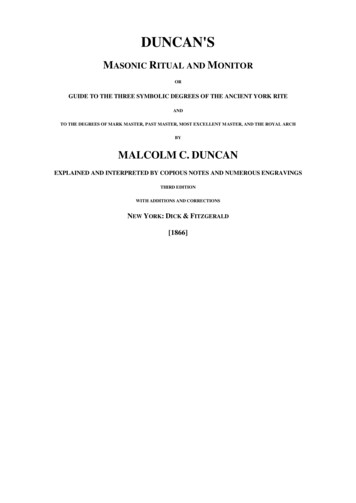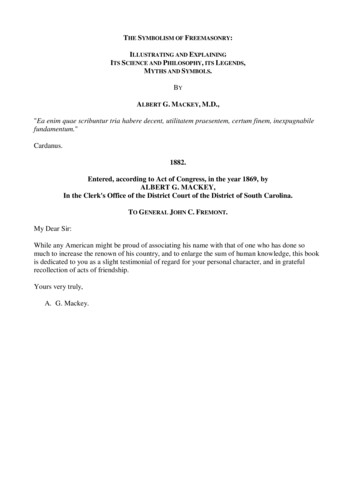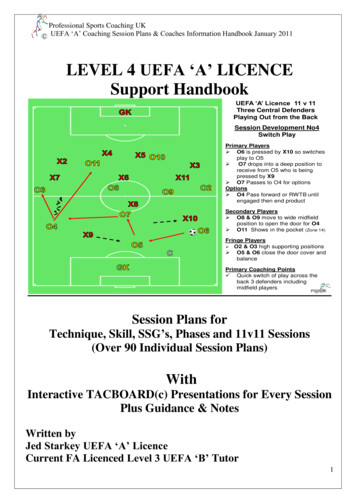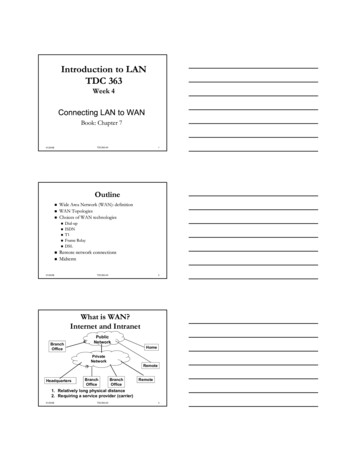
Transcription
DUNCAN'SMASONIC RITUAL AND MONITORORGUIDE TO THE THREE SYMBOLIC DEGREES OF THE ANCIENT YORK RITEANDTO THE DEGREES OF MARK MASTER, PAST MASTER, MOST EXCELLENT MASTER, AND THE ROYAL ARCHBYMALCOLM C. DUNCANEXPLAINED AND INTERPRETED BY COPIOUS NOTES AND NUMEROUS ENGRAVINGSTHIRD EDITIONWITH ADDITIONS AND CORRECTIONSNEW YORK: DICK & FITZGERALD[1866]
p. 3PREFACETHE objects which Freemasonry was founded to subserve are honorable and laudable; nor is itintended in the following pages to disparage the institution or to undervalue its usefulness. It has, atvarious times and in several countries, incurred the ill-will of political parties and of religiousbodies, in consequence of a belief, on their part, that the organization was not so purely benevolentand philanthropic as its members proclaimed it to be. In the State of New York, many years ago, itwas supposed, but we think unjustly, to wield a powerful political influence, and to employ itunscrupulously for sinister ends. The war between Masonry and Anti-Masonry which convulsed theState at that period is still fresh in the remembrance of many a party veteran. The Order, however,has long since recovered from the obloquy then heaped upon it, and is now in a flourishingcondition in most parts of the civilized world.The purpose of this work is not so much to gratify the curiosity of the uninitiated as to furnish aguide for the neophytes of the Order, by means of which their progress from grade to grade may befacilitated. Every statement in the book is authentic, as every proficient Mason will admit to himself,if not to be public, as he turns over its pages. The non-Masonic reader, as he peruses them, willperhaps be puzzled to imagine why matters of so little real importance to society at large shouldhave been so industriously concealed for centuries, and still more surprised that society should havebeen so extremely inquisitive about them. "But such," as Old Stapleton says, in 'Jacob Faithful,' "ishuman nature." The object of the Order in making a profound mystery of its proceedings is obviousenough. Sea-birds are not more in-variably attracted toward a lighted beacon on a dark night, thanmen to whatever savors of mystery. Curiosity has had a much greater influence in swelling theranks of Masonry than philanthropy and brotherly love. The institution, however, is nowsufficiently popular to stand upon its own merits, without the aid of clap-trap, so "via the mantlethat shadowed Borgia."It will be observed by the initiated, that the following exposition gives no information throughwhich any person not a Mason could obtain admission to a Lodge. It is due to the Order that itsmeetings should not be disturbed by the intrusion of persons who do not contribute to its support, orto the furtherance of its humane design, and whose motives in seeking admission to itsp. 4halls would be impertinent and ungentlemanly. The clew to the Sanctum Sanctorum is, therefore,purposely withheld.In its spirit and intention Masonry is certainly not a humbug, and in its enlightened age so excellentan institution should not incur the liability of being classed with the devices of charlatanry byaffecting to wear a mystic veil which has long been lifted, and of which we are free to say, that,unlike that of the false prophet of Kohrassan, it has no repulsive features behind it.The author of the following work does not conceive that it contains a single line which can in anyway injure the Masonic cause; while he believes, on the other hand, that it will prove a valuablemade mecum to members of the Order, for whose use and guidance it is especially designed.It will be seen that the "work" quoted in this treatise differs from that of Morgan, Richardson, andAlleyn; but as this discrepancy is fully explained at the close of the remarks on the Third Degree, itis not deemed necessary to make further allusion to it here.
p. 5THE AUTHORITIES REFERRED TO IN THIS WORK ARE AS FOLLOWS:"THE HISTORICAL LANDMARKS." By the Rev. G. Oliver, D. D. In two volumes. London: R.Spencer. 1845."THE THEOCRATIC PHILOSOPHY OF FREEMASONRY." By the same author and publisher.1840."ORIGIN OF THE ENGLISH ROYAL ARCH." By the same, &c., &c., &c."A LEXICON OF FREEMASONRY." By Albert G. Mackey, M. D. Charleston: Burges & James.1845."THE FREEMASON'S TREASURY." By the Rev. George Oliver, D. D. London: R. Spencer. 1863."THE INSIGNIA OF THE ROYAL ARCH." By the same author. London: R. Spencer. 1847."EXPOSITION OF THE MYSTERIES." An Inquiry into the Origin, History, and Purport ofFreemasonry. By John Fellows, A. M. New York. 1835."BOOK OF THE CHAPTER." By Albert G. Mackey, M. D. New York: Macoy & Sickles. 1864."ALLYN'S RITUAL." New York: John Gowan."WEBB'S MONITOR." New York: Macoy & Sickles."TENT LIFE IN THE HOLY LAND." By Rev. Irenæus Prime, D. D. New York: Harper & Bros."MONITOR OF FREEMASONRY." By Jabez Richardson. Philadelphia. Pa.
p. 6p. 7DUNCAN'SRITUAL AND MONITOROFFREEMASONRY.ENTERED APPRENTICE, OR FIRST DEGREESeven Freemasons, viz., six Entered Apprentices and one Master Mason, acting under a charter ordispensation from some Grand Lodge, is the requisite number to constitute a Lodge of Masons, andto initiate a candidate to the First Degree of Masonry.They assemble in a room well guarded from all cowans and eaves-droppers, in the second or thirdstory (as the case may be) of some building suitably prepared and furnished for Lodge purposes,which is, by Masons, termed "the Ground Floor of King Solomon's Temple."The officers take their seats, as represented in the Plate on page 8. Lodge-meetings are arranged asfollows, viz.: a "regular" is held but once a month (i.e. every month on, or preceding, the full of themoon in each month); special meetings are held as often as the exigency of the case may seem todemand, if every night in the week, Sunday excepted. If Tuesday should be Lodge night, by Masonsit would be termed, "Tuesday evening on or before the full of the moon, a regular night."p. 8p. 9All business relative to Masonry is done at a "regular," and in the Third, or Master Mason Degree.None but Master Masons are allowed to be present at such meetings; balloting for candidates isgenerally done on a "regular," also receiving petitions, committee reports, &c., &c.A petition for the degrees of Masonry is generally received at a "regular" (though, as a commonthing, Grand Lodges of each State make such arrangements as they may deem best for theregulation of their several subordinate Lodges).
LODGE OF ENTERED APPRENTICES, FELLOW CRAFTS, OR MASTER MASONS.1.Candidate prays. 2. First stop. 3. Second stop. 4. Third stop. 5. Room where candidates are prepared. 6. Anteroom where members enter the lodge. 7. Hall. 8. Doors. 9. Door through which candidates are admitted intothe lodge. 10. Door through which members enter. 11. Altar. 12. Treasurer. 13. Secretary. 14. Senior Deacon.15. Worshipful Master. 16. Junior Warden. 17 and 18. Stewards. 19. Senior Warden. 20. Junior Deacon. 21.Tyler.At the time of receiving a petition for the degrees of Masonry, the Master appoints a committee ofthree, whose duty it is to make inquiry after the character of the applicant, and report good or bad,as the case may be, at the next regular meeting, when it is acted upon by the Lodge.
Upon reception of the committee's report, a ballot is had: if no black balls appear, the candidate isdeclared duly elected; but if one black ball or more appear, he is declared rejected.No business is done in a Lodge of Entered Apprentices, except to initiate a candidate to the FirstDegree in Masonry, nor is any business done in a Fellow Crafts' Lodge, except to pass a FellowCraft from the first to the second degree. To explain more thoroughly: when a candidate is initiatedto the First Degree, he is styled as "entered;" when he has taken the Second Degree, "passed." andwhen he has taken the Third, "raised" to the sublime Degree of a Master Mason. No one is allowedto be present, in any degree of Masonry, except he be one of that same degree or higher. The Masteralways wears his hat when presiding as such, but no other officer, in a "Blue Lodge" (a "BlueLodge" is a Lodge of Master Masons, where only three degrees are conferred, viz.: EnteredApprentice, 1st; Fellow Craft, 2d; Master Mason, 3d. Country Lodges are mostly all "Blue Lodges").A Lodge of Fellow Craft Masons consists of five, viz.: Worshipful Master, Senior and JuniorWardens, Senior and Junior Dear hens; yet seven besides the Tyler generally assist, and take theirseats as in the Entered Apprentice's Degree. The Fellow Craft Lodge is styled by Masons "theMiddle Chamber of King Solomon's Temple."Three Master Masons is the requisite number to constitute a Masters' Lodge, which is called byMasons "the Sanctum Sanctorum, or, Holy of Holies of King Solomon's Temple." Although threeare all that is required by "Masonic Law" to open a Third Degree Lodge, there are generally sevenbesides the Tyler, as in the other degrees.All the Lodges meet in one room, alike furnished, for the conferringp. 10of the different degrees (E. A., F. C., and M. M.); but they are masonically styled by the Craft as theGround Floor, Middle Chamber, and Sanctum Sanctorum.A person being in the room, while open on the First Degree, would not see any difference in theappearance of the room from a Master Masons' Lodge. It is the duty of the Tyler to inform all thebrethren on what degree the Lodge is at work, especially those that arrive too late (i.e., after theLodge has been opened). so that none will be liable to give the wrong sign to the Worshipful Masterwhen he enters. If the Lodge is opened on the First Degree, there might he present those who hadtaken only one degree, and, if the brother arriving late should be ignorant of this fact, and makea Third Degree sign, they would see it; consequently, caution on this point should always be givento such brethren by the Tyler, before entering the Lodge.Usual way: Brethren that arrive too late come up to the ante-room, which they find occupied by theTyler, sword in hand; after inquiring of the Tyler on what degree the Lodge is at work (opened),they put on an apron, and request the Tyler to let them in; the Tyler steps to the door, gives one rap( ), i.e. if opened on the First Degree; two raps ( ), if Second Degree; three raps ( ), if the ThirdDegree; which being heard by the Junior Deacon, on the inside, he reports to the Master the alarm,as follows, viz.:J. D.--Worshipful Master, there is an alarm at the inner door of our Lodge.W. M.--Attend to the alarm, Brother Junior, and ascertain the cause.
Junior Deacon opens the door and inquires of the Tyler the cause of the alarm; when the Tyler willreport the brethren'sp. 11names (which we will suppose to be Jones, Brown,and Smith).J. D. (to the Master)--Brothers Jones, Brown, andSmith are without, and wish admission.If they are known to the Master, he will say, "Admitthem."Deacon opens the door, and says, in an under toneof voice, "Come in." These brothers advance to thecentre of the Lodge, at the altar make the duegard,and sign of the degree on which the Lodge is opened,which is responded to by the Master, and then taketheir seats among the brethren. No brother isallowed to take his seat until he has saluted theWorshipful Master on entering a Lodge; and if oneomits his duty in this respect, he is immediatelyreminded of it by either the Master or some one ofthe brethren present. The Tyler generally cautionsMOST WORSHIPFUL MASTER IN THE EASTthe brethren, before entering the Lodge, aboutgiving the sign, before passing them through the door; the Junior Deacon the same, as soon as theyare in. This officer's station is at the inner door, and it is his duty to attend to all alarms from theoutside, to report the same to the Master, and get his permission before admitting any one.The author remembers seeing the duegard and sign of a Master Mason given, while yet an EnteredApprentice Mason: he was sitting one evening in the Lodge, when a brother of the Third Degreecame in, and very carelessly saluted the Master with the Master's duegard and sign, undoubtedlysupposing the Lodge open on that degree--a very common error among Masons.In large cities there are often more than one Lodge. Some cities have ten or twenty, and even more;in the cities of New York and Brooklyn there are one hundred and thirty-five Lodges, besidesChapters, Councils, Commanderies, &c., &c. Consequently, there are Lodge-meetings of some sortevery night in the week, excepting Sunday, and of course much visiting is going on between thedifferent Lodges. The visitors are not all known to the Masters personally; but the brethren are,generally, acquainted with each other, and of course have often to be vouched for in some of theLodges, or pass an examination; and for the purpose of giving the reader an idea of the manner inwhich they are admitted, the author will suppose a case, in order to illustrate it. Jones, Smith, andBrown, belonging to Amity Lodge, No. 323, in Broadway, New York, wish to visit Hiram Lodge,No. 449, of Twenty-fifth Street, and for that purpose go on Lodge night to the hall of Hiram Lodge,No. 449, and ask the Tyler for admission. The Tyler, perhaps, will say--Brothers, are youacquainted with our Master, or any of the brethren in the Lodge? Smith, Jones, and Brown will say,perhaps, Yes; or, We can't tell, but pass our names in, and if there are any acquainted withp. 12
us, they will vouch for our masonic standing. The Tyler does so, in the manner already described;and, if they are vouched for by either Master or any brother, they are admitted, the Tyler tellingthem on what degree the Lodge is opened, besides furnishing them with aprons.On the evening of a Lodge-meeting, brethren generally get together at an early hour at the Lodgeroom, which has been opened and cleaned out by the Tyler. On arrival of the Master, and the hourof meeting, the Master repairs to his seat in the east, puts on his ha
The non-Masonic reader, as he peruses them, will perhaps be puzzled to imagine why matters of so little real importance to society at large should have been so industriously concealed for centuries, and still more surprised that society should have been so extremely inquisitive about them. "But such," as Old Stapleton says, in 'Jacob Faithful,' "is human nature." The object of the Order in .











